Looking for the Best Hanging Orchids? Different varieties may have different growth habits, but Dendrobiums cascade beautifully from heights!
Several orchids are tropical epiphytes that grow on barks of trees and are well-suited to cascade from a ceiling or hanging basket.
Especially the pendant-like Dendrobium varieties, with plentiful blooms, are the best hanging orchids for your home. Let’s explore!
Best Hanging Dendrobium Orchid Varieties
With slender stems and big flowers, most Dendrobiums on this list are epiphytes that dangle gracefully from baskets and thrive in dappled sunshine and temperatures of 58-75 F (14-24 C). They are typically large plants in tiny pots that go dormant in winter.
1. Honohono
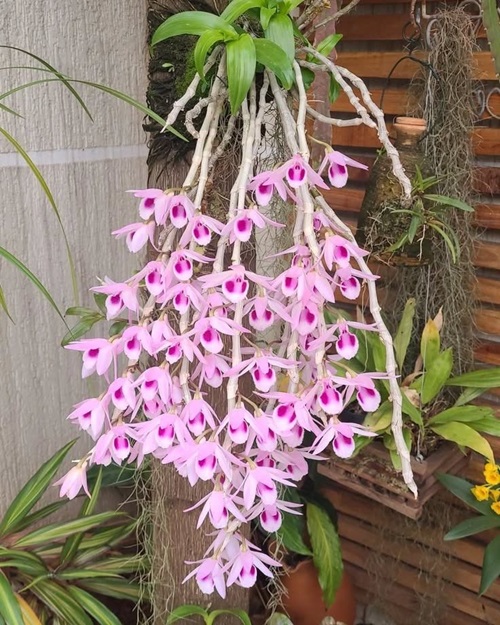
Botanical Name: Dendrobium anosmum
This deciduous epiphyte, native to the Phillippines, New Guinea, Thailand, and Sri Lanka, sports raspberry-scented purple-pink flowers and strap-shaped fleshy leaves that grow on pseudobulbs. Commonly used for leis (garlands) in Hawaii, it flowers in dry weather.
However, the plant needs ample water for growth, typically occurring during the rainy season, and goes dormant in cold weather. When cultivated, the stems grow up to about 2 feet long and prefer full sun for a few hours daily.
2. Loddiges’ Dendrobium
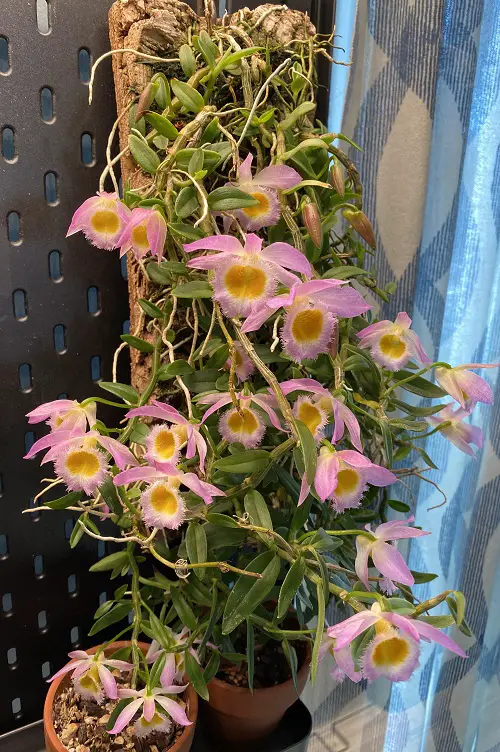
Botanical Name: Dendrobium loddigesii
Native to Laos, Vietnam, and China, the Loddiges’ Dendrobium is a tiny, semi-evergreen orchid with pendulous stems bearing singular 5 cm large floral-scented flowers in pastel pink and purple with orange centers and fringed edges.
Preferring bright, filtered sun to partial shade and regular misting during summers, use a bark-based potting mix with added perlite, coir, or moss when growing in hanging baskets.
3. Noble Dendrobium
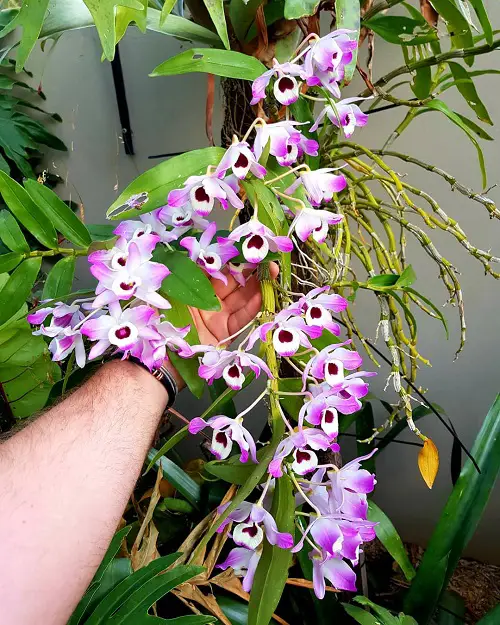
Botanical Name: Dendrobium nobile
Native to the Far East, Noble Dendrobium is one of the most well-known ornamental and medicinal orchid varieties. Pushing out stunning white and pink fragrant blooms in late winter to early spring, this cascading orchid variety needs plenty of light to flourish.
Preferring ample air circulation, the plant needs lower temperatures of about 50 F (10 C) for a month to trigger blooms. Increase watering as temperatures rise in spring and summer and pull back during fall and winter.
4. Leafless Dendrobium
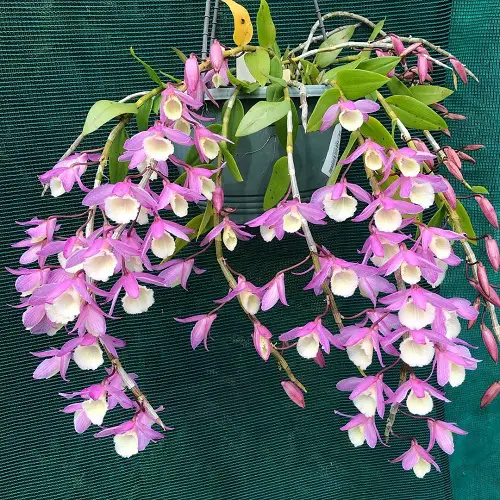
Botanical Name: Dendrobium aphyllum
Also known as the hooded orchid, this tropical Asian variety loses its foliage during the resting period and is left with slender pendulous stems and soft pale pink to white trumpet-shaped blooms along its length.
Preferring light shade and temperate conditions, the easy-to-cultivate plant needs ample moisture during the growing season and very little during fall and winter.
5. Parish’s Dendrobium
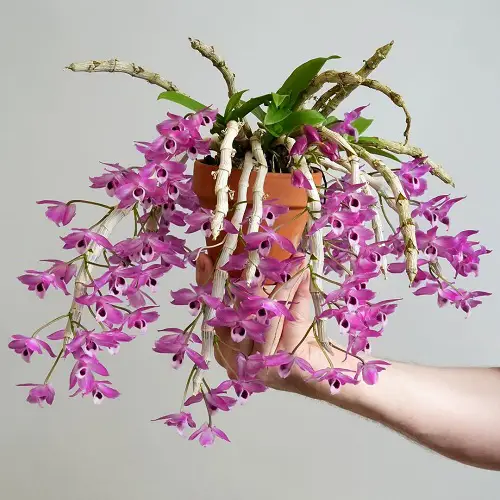
Botanical Name: Dendrobium parishii
With pseudobulbs that grow looking like fingers, this fragrant variety is consequently also known as “hand orchids” with vivid purple blooms in winter and spring that smell like strawberries and cream!
Named after botanist Charles Parish in 1863, the Parish’s Dendrobium is native to the wet tropical regions in the Indo-China belt and thrives in warmth and bright, indirect light.
6. Primrose Dendrobium
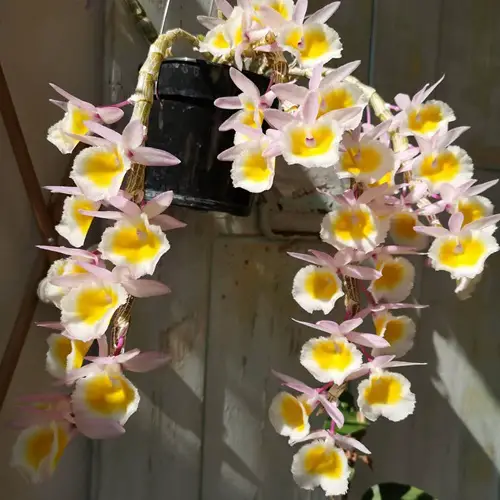
Botanical Name: Dendrobium primulinum
If you are low on space, the abundant-blooming compact primrose dendrobium is perfect for you! Producing large yellow flowers with an orange center that bloom from nodes on leafless canes, this one rarely gets longer than 1.5 feet.
7. Falconer’s Dendrobium
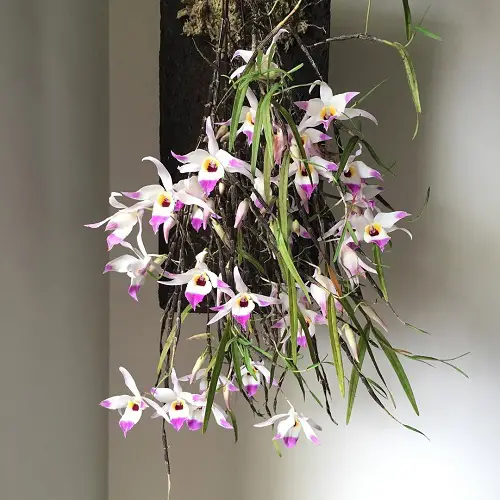
Botanical Name: Dendrobium falconeri
Rare in modern orchid collections, the last on the list is Falconer’s Dendrobium. This is one of the larger varieties on this list. It reaches lengths of up to 6 feet with large white flowers with purple markings.
The Falconer’s Dendrobium is hardy to most environmental factors and, hence, is a perfect, easy-to-care-for choice for beginner gardeners and fresh orchid enthusiasts! Read on to learn how to care for orchids.


